英语语法之时间状语从句
英语语法讲解状语从句
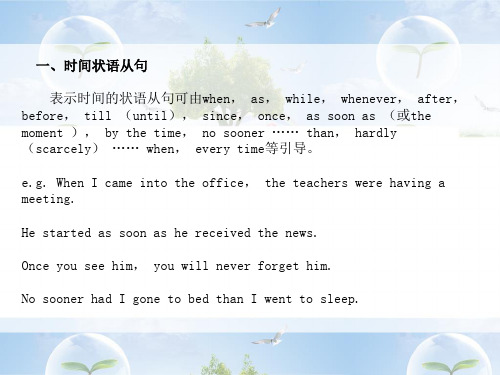
Whatever ( = No matter what ) you say, I'll never change my mind.
八、方式状语从句
方式状语从句常由as, as if (though), the way, rather than 等引导。
You can go swimming on condition that ( = if ) you don't go too far away from the river bank.
If he had come a few minutes earlier, he could have seen her.
e.g. He is disappointed because he didn't get the position.
As it is raining, I will not go out.
Now that you mention it, I do remember.
三、地点状语从句
引导地点状语从句的连词是where 和wherever等。 e.g. Sit wherever you like. Make a mark where you have a question.
一、时间状语从句
表示时间的状语从句可由when, as, while, whenever, after, before, till (until), since, once, as soon as (或the moment ), by the time, no sooner …… than, hardly (scarcely) …… when, every time等引导。
高中英语语法总结之状语从句(共37张ppt)

• Difficulties are nothing if we are not afraid of them.如果我们不怕困难,困难就算不了什 么了。
• We shall go there tomorrow unless it rains. = We shall go there tomorrow if it doesn’t rain. 除非下雨,我们明天就去那里。
• Every time I travelled by boat, I got seasick.我 每次乘船都晕船。
• The moment I heard the song, I felt cheerful. 我一听到这首歌,就感到很愉快。
• Next time you come ,you’ll see him.下次你来 的时候,就会见到他。
• We were not tired though (although) we had worked all day.虽然我们干了一天活,但并 不累。
• (2)even if, even though(even if 和even though的意思为“即使”“纵使”有退一步 设想的意味,多用于书面语中)。
• 5、结果状语从句:
• (1)so that,so…that(so that前有逗号为 结果状语从句,so…that的so后面跟形容词 或副词)。
• We turned up the radio, so that everyone heard the news.我们把收音机的音量放大, 大家都听到了新闻。
• Seeing (that) he was badly ill, we sent for the doctor.鉴于他病情严重,我们派人去请医生 去了。
高中英语语法时间状语从句讲解
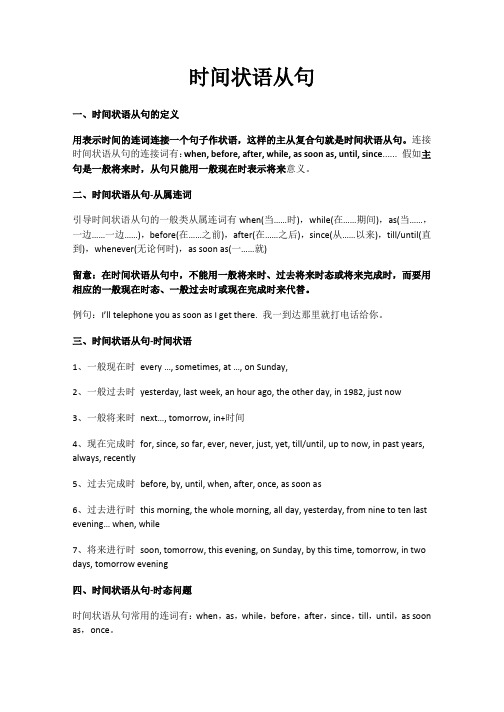
时间状语从句一、时间状语从句的定义用表示时间的连词连接一个句子作状语,这样的主从复合句就是时间状语从句。
连接时间状语从句的连接词有:when, before, after, while, as soon as, until, since...... 假如主句是一般将来时,从句只能用一般现在时表示将来意义。
二、时间状语从句-从属连词引导时间状语从句的一般类从属连词有when(当……时),while(在……期间),as(当……,一边……一边……),before(在……之前),after(在……之后),since(从……以来),till/until(直到),whenever(无论何时),as soon as(一……就)留意:在时间状语从句中,不能用一般将来时、过去将来时态或将来完成时,而要用相应的一般现在时态、一般过去时或现在完成时来代替。
例句:I’ll telephone you as soon as I get there. 我一到达那里就打电话给你。
三、时间状语从句-时间状语1、一般现在时every …, sometimes, at …, on Sunday,2、一般过去时yesterday, last week, an hour ago, the other day, in 1982, just now3、一般将来时next…, tomorrow, in+时间4、现在完成时for, since, so far, ever, never, just, yet, till/until, up to now, in past years, always, recently5、过去完成时before, by, until, when, after, once, as soon as6、过去进行时this morning, the whole morning, all day, yesterday, from nine to ten last evening… when, while7、将来进行时soon, tomorrow, this evening, on Sunday, by this time, tomorrow, in two days, tomorrow evening四、时间状语从句-时态问题时间状语从句常用的连词有:when,as,while,before,after,since,till,until,as soon as,once。
初中英语语法课件 时间状语从句

It will be four days before they come back. 他们要过四天才能回来。 Einstein almost knocked me down before he saw me. 爱因斯坦几乎把我撞倒才看到我。 My father had left for Canada just before the letter arrived.我父亲恰好在信到之前去加拿大了。
由till或until 引导的时间状语 从句
till和until一般情况下两者可以互换,但是在强调句型中多 用until。 如果主句中的谓语动词是瞬时动词时,必须用否定形式; 如果主句中的谓语动词是延续性动词时,用肯定或否定形式 都可以,但表达的意思不同。 till不可以用在句首,而until可以放在句首。
由before和 after引导的时 间状语从句
一般情况下,before和after引导的时间状语从句的主句用 将来时,从句用现在时。 before引导的主句谓语用过去完成时,则从句动词多用一般 过去时。 After表示主句动作发生在从句动作之后。 主句和从句的动作的时间关系正好与before引导的从句相反。
由when引导的 时间状语从句
when意为“当......时”,引导时间状语从句,表示 主句的动作和从句的动作同时或先后发生。 Faith is the bird that feels the light when the dawn is still dark. 信念是黎明前的黑夜里能感受到光明的鸟儿。 When I was wandering in the street, I met her. 我在街上徘徊的时候遇到了她。
They had not been arried four months before they were divorced. 他们结婚还不到四个月就离婚了。 After we had finished the work, we went home. 完成工作之后,我们回家了。(从句用过去完成时,主句用一般 过去时)
中考英语语法学习之状语从句讲义

中考英语语法学习之状语从句一、什么是状语从句?状语从句是指一个句子中,作为状语的从句。
状语从句通常由引导词引导,如连词if、whether、how、when、why 等。
状语从句的作用是修饰主句,起到说明、限制或补充等作用。
二、状语从句的分类1.时间状语从句时间状语从句是指用来说明事件发生的时间的从句。
它通常由连词when、while、since、before、after等引导词引导,用来修饰主句中的时间。
例如:I have been to China twice. (我第一次去中国是在两年前。
)He has been studying English for five years. (他已经学习英语五年了。
)They will arrive at the airport at 7 pm. (他们将在晚上7点到达机场。
)We had a meeting at 2 pm this afternoon. (今天下午我们开了一个会议。
)需要注意的是,时间状语从句通常放在主句之前或之后,但在某些情况下可能会放在主句中间。
2.地点状语从句地点状语从句是指用来说明事件发生的地点的从句。
它通常由连词where、why、how等引导词引导,用来修饰主句中的地点。
例如:I saw her in the library. (我在图书馆看到她。
)They are going to have a meeting in the conference room. (他们将在会议室里开会。
)He is studying in his bedroom. (他正在卧室里学习。
)We had dinner at a restaurant last night. (昨晚我们在一家餐厅吃了晚饭。
)需要注意的是,地点状语从句通常放在主句之前或之后,但在某些情况下可能会放在主句中间。
3.原因状语从句原因状语从句是指用来说明事件发生的原因的从句。
初中英语语法之状语从句类型及考点讲义

初中英语语法之状语从句类型及考点讲义状语从句概念解析状语从句指句子用作状语时,起副词作用的句子,可以修饰谓语、非谓语动词、定语、状语或整个句子,可分为时间、地点、原因、条件、目的、结果、让步、方式和比较等从句,是英语复合句学习的一个重点,在各类考试中都会经常出现,这次就来给大家讲解一下什么是状语从句。
1. 时间状语从句:常用引导词:when, as, while, as soon as, before, after, since , till, until特殊引导词:the minute, the moment, the second, every time, the day,the instant, immediately , directly, no sooner … than, hardly …when, scarcely … when instantlyI ran into the classroom as soon as the bell rang.2. 地点状语从句:常用引导词:where特殊引导词:wherever, anywhere, everywhereWherever the sea is , you will find seamen.3. 原因状语从句:常用引导词:because=in that, since=now that, as, for特殊引导词:seeing that, now that, in that, considering that, given thatI 'm late because I didn't caught the bus.4. 目的状语从句:常用引导词:so that, in order that特殊引导词: for fear that(唯恐/生怕),in the hope that, for the purpose that, to the end thatYou should book the hotel in advance so that the travel will be more easy.5.结果状语从句:常用引导词:so … that, such … that特殊引导词:such that, to the degree that, to the extent that, to such a degree thatHe is so young that he can't have meal by himself.6. 条件状语从句:常用引导词:if, unless,特殊引导词:as/so long as(只要), only if, providing/provided that(倘若), supposing that(倘若), in case that(以防), on condition thatYou can go to London as long as you have passport.7.让步状语从句:常用引导词:though, although, even if, even though特殊引导词: as(用在让步状语从句中必须要倒装),while,no matter …, in spite of the fact that, whatever, whoever, wherever, whenever, however, whichever, as if=as thoughThough we are old, we still can do these by ourselves.8. 比较状语从句:常用引导词:as(同级比较), than(不同程度的比较)特殊引导词:the more …the more …; just as …,so…,no … more than; not A so much as BShe is as pretty as her mother.9. 方式状语从句:常用引导词:as, as if, how特殊引导词:the wayHe didn't so it the way his brother did.辨析:while,when,as三者引导的时间状语从句时间状语从句算是状语从句中最简单的一类,也是我们日常生活交流中最常用的一类,虽然难度不大,但引导词也不少,仍然有不少同学会弄混那几个常见引导词的用法,这次就为大家带来as,when,while这几个词的辨析方法,一起看看吧。
语法难点时间状语从句与原因状语从句的区别
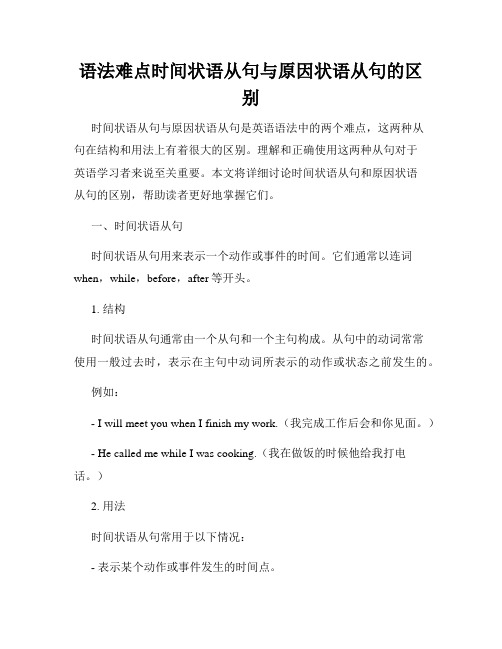
语法难点时间状语从句与原因状语从句的区别时间状语从句与原因状语从句是英语语法中的两个难点,这两种从句在结构和用法上有着很大的区别。
理解和正确使用这两种从句对于英语学习者来说至关重要。
本文将详细讨论时间状语从句和原因状语从句的区别,帮助读者更好地掌握它们。
一、时间状语从句时间状语从句用来表示一个动作或事件的时间。
它们通常以连词when,while,before,after等开头。
1. 结构时间状语从句通常由一个从句和一个主句构成。
从句中的动词常常使用一般过去时,表示在主句中动词所表示的动作或状态之前发生的。
例如:- I will meet you when I finish my work.(我完成工作后会和你见面。
)- He called me while I was cooking.(我在做饭的时候他给我打电话。
)2. 用法时间状语从句常用于以下情况:- 表示某个动作或事件发生的时间点。
- 表示两个同时发生的动作或事件。
- 表示一个动作或事件发生的原因。
例如:- She always wakes up early when the sun rises.(太阳升起时,她总是早早醒来。
)- We were having dinner while it started to rain.(下雨的时候我们正在吃饭。
)- He missed the bus because he woke up late.(因为他起得晚,所以错过了公交车。
)二、原因状语从句原因状语从句用来表示引起一个动作或事件的原因。
它们通常以连词because,since,as等开头。
1. 结构原因状语从句也是由一个从句和一个主句构成。
从句中的动词通常使用一般现在时,表示主句中动词所表示的动作或状态的原因。
例如:- I couldn't sleep because it was too noisy.(因为太吵了,所以我睡不着。
)- Since you are here, let's start the meeting.(既然你在这里,我们就开始开会吧。
初中英语语法 状语从句
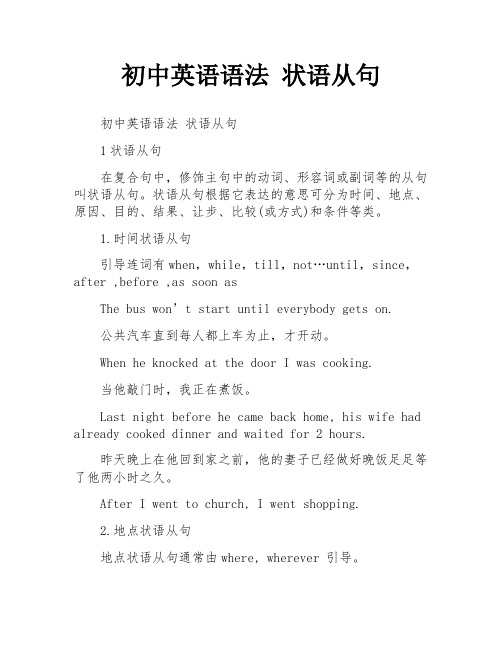
初中英语语法状语从句初中英语语法状语从句1状语从句在复合句中,修饰主句中的动词、形容词或副词等的从句叫状语从句。
状语从句根据它表达的意思可分为时间、地点、原因、目的、结果、让步、比较(或方式)和条件等类。
1.时间状语从句引导连词有when,while,till,not…until,since,after ,before ,as soon asThe bus won’t start until everybody gets on.公共汽车直到每人都上车为止,才开动。
When he knocked at the door I was cooking.当他敲门时,我正在煮饭。
Last night before he came back home, his wife had already cooked dinner and waited for 2 hours.昨天晚上在他回到家之前,他的妻子已经做好晚饭足足等了他两小时之久。
After I went to church, I went shopping.2.地点状语从句地点状语从句通常由where, wherever 引导。
Where there is a will, there is a way. 哪里有志向,哪里就有出路。
有志者事竟成。
Where there is a life, there is a hope. 哪里有生命,哪里就有希望。
留得青山在,不怕没柴烧。
Wherever you go, whatever you do, I will be right here waiting for you.不管你去哪里,不管你做什么,我都会在此守侯你。
3.原因状语从句引导连词有because,as, since。
He didn′t see the film because he had seen it.他没有看那部电影,因为他已经看过了。
They couldn’t get on the train,for it was too crowed.比较:because, since, as和for1)because语势最强,用来说明人所不知的原因,回答why提出的问题。
2023年中考英语语法专项之时间状语从句课件

3. 常用的时s soon as表示“一……就……”,引导时间状语从句,常和一般过去时 连用。例如:As soon as I arrived at the airport, I called my parents.
3. 常用的时间状语从句引导词
01 before 02 after 03
1. 什么是时间状语从句?
01 时间状语从句的种类 02 时间状语从句的语态 03
1. 什么是时间状语从句?
时间状语从句的种类
时间状语从句可以分为简单句和复合句两种,其中简单句只包含一个主 谓宾结构,而复合句则包含主句和从句两个部分。
1. 什么是时间状语从句?
时间状语从句的语态
时间状语从句的语态要与主句的谓语动词保持一致,即如果主句是肯定 句,则从句也要使用肯定句;如果主句是否定句,则从句也要使用否定 句。
2. 时间状语从句的语序和时态
2. 时间状语从句的语序和时态
01 语序
02 时态
03 连接词
2. 时间状语从句的语序和时态
语序
时间状语从句的语序是从句在主句之前,从句中的谓语动词要用陈述语 气。
2. 时间状语从句的语序和时态
时态
时间状语从句的时态与主句的时态有关,如果主句是一般现在时或将来 时,从句用一般现在时;如果主句是一般过去时,从句用过去时;如果 主句是过去将来时,从句用过去完成时;如果主句是现在完成时或将来 完成时,从句用完成时态。
以while引导的时间 状语从句省略
当主句的谓语动词为进行时态时,时间状语从句中的while可以省略。
4. 时间状语从句的省略
以as引导的时间状语 从句省略
当主句的谓语动词为进行时态时,时间状语从句中的as可以省略。
2024年人教版中考英语语法课件:状语从句知识点归纳

Wherever my sister visits, she will send me a postcard. =No matter where my sister visits, she will send me a postcard.
as
当.....时, 一边...一边...
强调主从句动作同时进行
I saw the sun as I opened the window.
1、时间状语从句
2、until/ till 引导词: ① until和till意为“直到”,很多时候可以互换,但是用于句首的时候,常用until。 Until you get back, I will sit here.
3、让步状语从句
(表示主句中的某一动作或状态与从句中的某一动作或状态在意义上有部分矛盾。) 1、although/though 引导词: although/though意为“尽管,虽然”,不与but连用,但可用yet/ still. Although/ though he works hard, yet he makes slow porgress.
③ She is such a beautiful girl that everybody loves her.
4、结果状语从句
(结果状语从句表示主句中某一动ห้องสมุดไป่ตู้或状态所产生的结果)
4、so…that… 与 such… that… 互换: 两者都意为“如此......以致于”
so+形容词+a/an+单数可数名词+that从句 人称代=s词uc是h为+a了/a避n+免我形重们容复、词,他+用们单来/数代她可替们数前/名面它词提们到”+等t过h代a的t词从人。句、人事称物代等词名有词人的称词、,单主复要数包以括及“你格、的我变、化他。,她/它、你们、
3英语语法详解:时间状语从句

英语语法详解:时间状语从句■引导时间状语从句的从属连词引导时间状语从句的从属连词很多,如较基本的有before, after, when, while, as, since, till, until, as soon as 等:Things were different when I was a child. 我小时候情况与现在不同。
We must strike while the iron is hot. 我们要趁热打铁。
It’s a long time since I met you last. 从上次见到你,已有很长时间了。
He waited until she was about to leave. 他等着一直到她准备离开。
除以上基本的引导时间状语从句的从属连词外,还有些本来不是从属连词却可用作从属连词的词:(1)表示“一…就”的从属连词:the moment, the minute, the second, the instant, immediately, directly, instantly, once, no sooner…than, hardly…when等。
如:Immediately he came I told him the news. 他一来我就把消息告诉了他。
The moment I saw him I knew there was no hope. 我一看到他就知道没希望了。
We had no sooner set out than it began to rain. 我们刚出发就下雨了。
Once he arrives, we can start. 他一来我们就可以开始。
(2)涉及time的几个从属连词:every time(每次),each time(每次),(the) next time(下次),any time(随时),the last time(上次),the first time(第一次)。
状语从句的时间原因条件等用法

状语从句的时间原因条件等用法状语从句的时间、原因、条件等用法状语从句是英语语法中常见的句子结构,用来修饰、说明主句中的动作、状态、原因等,起到限定、补充、解释主句的作用。
在使用状语从句时,我们需要注意其时间、原因、条件等用法。
本文将详细探讨状语从句的时间、原因、条件等用法,并通过例句进行解释,以帮助读者更好地理解和运用状语从句。
1. 时间状语从句时间状语从句用来表示主句中的动作或状态所发生的时间。
常见的引导时间状语从句的连词有:when(当…时候)、while(当…的时候)、before(在…之前)、after(在…之后)、since(自从…以来)等。
例如:- When I got home, it was already dark.(当我到家时,天已经黑了。
)- While I was studying, my phone rang.(我正在学习的时候,手机响了。
)- He left home before the storm started.(他在暴风雨开始前离家了。
)- After they finished dinner, they went for a walk.(他们吃完晚饭后去散步了。
)- Since I moved to the city, I have made many new friends.(自从我搬到这个城市以来,我结交了许多新朋友。
)2. 原因状语从句原因状语从句用来说明主句中的动作或状态发生的原因。
常见的引导原因状语从句的连词有:because(因为)、since(因为)、as(由于)、due to(由于)、for(因为)等。
例如:- I couldn't go to the party because I was sick.(我因为生病不能去参加聚会。
)- Since it's raining, we should bring an umbrella.(既然下雨了,我们应该带把伞。
初中英语语法学习之状语从句精讲

初中英语语法学习之状语从句精讲英语状语从句是英语学习中的一个重要考点,下面将针对英语状语从句进行考点归纳。
一、时间状语从句时间状语从句是语法中的一个重要考点,下面是一些常见的时间状语从句:when:表示某个时间点或时间段,如“I will arrive at the airport when the plane takes off.”before:表示某个时间点或时间段之前,如“I will eat breakfast before I go to work.”after:表示某个时间点或时间段之后,如“I will finish my homework after I have dinner.”while:表示某个时间点或时间段持续,如“I was studying while she was sleeping.”as soon as:表示某个时间点或时间段一过去就发生,如“I will call you as soon as I get home.”until:表示某个时间点或时间段一直持续,如“I won't leave until I have finished my work.”since:表示某个时间点或时间段以来,如“I have been living in this city since I moved here last year.”when/while/as:这些词都可以引导时间状语从句,但它们的使用略有不同,需要根据具体语境选择使用哪个。
需要注意的是,如果主句是一般将来时,从句只能用一般现在时,如“I will go to the store tomorrow”中的“tomorrow”就是时间状语从句。
二、地点状语从句地点状语从句是语法中的一个重要考点,下面是一些常见的地点状语从句: where:表示某个地点,如“I will go to the store where I bought the groceries.”that:表示某个地点或位置,如“I saw a beautiful sunset over that mountain.”which:表示某个地点或位置,如“The building which is on fire needs to be evacuated immediately.”where/that/which:这些词都可以引导地点状语从句,但它们的使用略有不同,需要根据具体语境选择使用哪个。
初中英语知识点归纳时间状语从句的用法
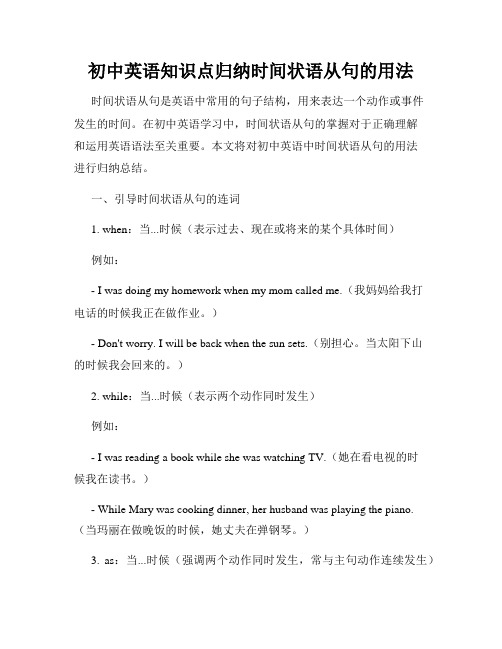
初中英语知识点归纳时间状语从句的用法时间状语从句是英语中常用的句子结构,用来表达一个动作或事件发生的时间。
在初中英语学习中,时间状语从句的掌握对于正确理解和运用英语语法至关重要。
本文将对初中英语中时间状语从句的用法进行归纳总结。
一、引导时间状语从句的连词1. when:当...时候(表示过去、现在或将来的某个具体时间)例如:- I was doing my homework when my mom called me.(我妈妈给我打电话的时候我正在做作业。
)- Don't worry. I will be back when the sun sets.(别担心。
当太阳下山的时候我会回来的。
)2. while:当...时候(表示两个动作同时发生)例如:- I was reading a book while she was watching TV.(她在看电视的时候我在读书。
)- While Mary was cooking dinner, her husband was playing the piano.(当玛丽在做晚饭的时候,她丈夫在弹钢琴。
)3. as:当...时候(强调两个动作同时发生,常与主句动作连续发生)例如:- It started raining as I left the house.(当我离开房间的时候开始下雨了。
)- As the sun rose, the birds began to sing.(当太阳升起的时候,鸟儿开始唱歌。
)4. before:在...之前例如:- Please finish your homework before you go out to play.(在出去玩之前请先把作业完成。
)- The train had left before I arrived at the station.(在我到达车站之前火车已经开走了。
)5. after:在...之后例如:- We will have a party after the final exam.(期末考试之后我们要举办一个派对。
英语语法时间状语从句
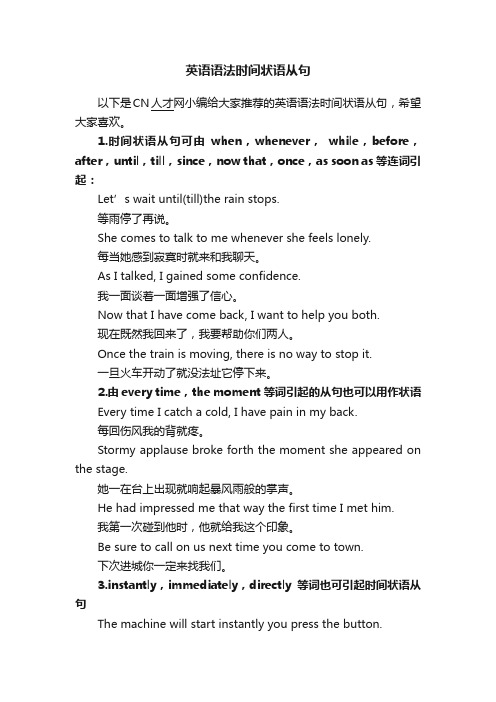
英语语法时间状语从句以下是CN人才网小编给大家推荐的英语语法时间状语从句,希望大家喜欢。
1.时间状语从句可由when,whenever,while,before,after,until,till,since,now that,once,as soon as等连词引起:Let’s wait until(till)the rain stops.等雨停了再说。
She comes to talk to me whenever she feels lonely.每当她感到寂寞时就来和我聊天。
As I talked, I gained some confidence.我一面谈着一面增强了信心。
Now that I have come back, I want to help you both.现在既然我回来了,我要帮助你们两人。
Once the train is moving, there is no way to stop it.一旦火车开动了就没法址它停下来。
2.由every time,the moment等词引起的从句也可以用作状语Every time I catch a cold, I have pain in my back.每回伤风我的背就疼。
Stormy applause broke forth the moment she appeared on the stage.她一在台上出现就响起暴风雨般的掌声。
He had impressed me that way the first time I met him.我第一次碰到他时,他就给我这个印象。
Be sure to call on us next time you come to town.下次进城你一定来找我们。
3.instantly,immediately,directly等词也可引起时间状语从句The machine will start instantly you press the button.你一按电钮机器就会开动。
英语语法12之状语从句

一、时间状语从句
①when引导的从句有时表示“突然”、“忽然”或“(正在)这时”的意思。这时 when=and then,just then.从句通常置于句末。从句中的谓语动词通常用一般过 去时;主句一般用过去进行时,过去完成时或be about to。 举例:We discussed the shipping date till 3 o’clock,when the customer call on us.
一、时间状语从句
9.as soon as (一......就),as/so long as(在......期间,......之久)引导的时间状 语从句。 举例:I will let you know where I go as soon as I know myself.
I will work as long as I live. [注]so long as较常用,语气比as long as强些。 10.no sooner ...... than,hardly/scarcely/barely ......when/before引导的时间状 语从句,表示从句谓语的动作紧接着主句谓语的动作发生,意思是“刚刚...... 就”“立即”。从句多用一般过去时,主句常用过去完成时。 举例:I had no sooner done it than I regretted it.
It is five weeks since he has smoked (抽烟已经五个星期了) ②ever since引导的从句,即使谓语是持续性动词或状态动词用一般过去时, 仍然表示从句的动作或状态延续至今 举例:The man has lived in this old house ever since he was born.
九年级英语时间状语从句语法规律总结

九年级英语时间状语从句语法规律总结1.when 引导的时间状语从句when(当……时候)引导的从句,从句中的动词可以是终止性动词,也可以是持续性动词。
在when引导的时间状语从句中,当主句表示将来时,从句用一般现在时表示将来.I want to be a teacher when I grow up .长大后我想成为一名教师。
2.while引导的时间状语从句While(当……时候)引导的从句,强调主从句的动作同时发生或主句动作在从句动作持续过程中的某一时刻发生。
从句中的谓语动词应用延续性动词或表状态的词,并且从句常用进行时态。
I met Anne while I was taking a walk in the park.我在公园散步时遇到了安妮。
3.as soon as 引导的时间状语从句as soon as引导时间状语从句,表示“一……就……”。
主句和从句的动作几乎在同时发生,或间隔时间很短。
如果主句用一般将来时,那么从句用一般现在时表示将来。
Please call me up as soon as you arrive there.请你一到那儿就给我打电话。
4.before/after 引导的时间状语从句before(在……之前)引导的时间状语从句一般表示主句的动作发生在从句动作之前。
after (在……之后)引导的时间状语从句一般表示主句的动作发生在从句动作之后。
He will come to see you before he leaves Beijing.他离开北京之前会来看你的。
After she locked the door ,she left.她锁上门之后就走了。
5. until 引导的时间状语从句until(直到……)当其用于肯定句时,表示主句的动作一直持续到until从句所表示的时间,即表示动作的终点,谓语动词必须是持续性动词,如live, wait, stay等。
当其用于否定句时,表示主句的动作直到until从句所表示的时间才发生,即表示动作的起点,谓语动词为延续性或非延续性动词均可。
完整版英语语法状语从句的归纳总结
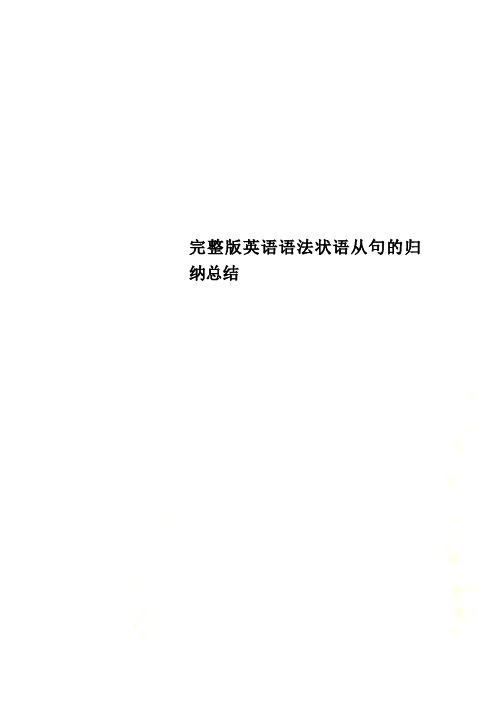
完整版英语语法状语从句的归纳总结英语语法状语从句的归纳总结在复合句中修饰主句或主句中的某一成分的从句叫状语从句。
状语从句通常由从属连词或起连词作用的词组引导,有时甚至不需要连词直接和主句连接起来。
状语从句根据它表达的意思不同,可分为时间、地点、原因、目的、结果、条件、方式、比较、让步等九类。
一、时间状语从句时间状语从句是表示时间关系的从句。
可以引导时间状语从句的连词很多,根据意义和主从句之间的时间关系,通常可分为以下几种情况:A.when, while, as, wheneverwhen, while, as表示主句谓语作和从句的谓语动作同时发生或几乎同时发生。
1.when①when表示点时间时,从句中用短暂性动词;表示段时间时,用持续性动词。
When I got home, my family were already having dinner.我到家的时候,全家已在吃晚饭。
(when表示点时间)When they were still talking and laughing,the teacher came in.当他们还在说笑的时候,老师进来了。
(when表示段时间)He waved a hello when he saw her.当他看见她的时候,就挥手打了个招呼。
(when 表示点时间)When you think you know nothing, you begin to know something.当你认为自己一无所知的时候,就开始知道一些事情了。
(when表示段时间)注意:当when意思是正当……时候(and at that moment)时,when只能跟在前一分句之后。
He was about to go to bed when the doorbel rang.他正要上床,忽然门铃响了。
They were watching the World Cup when suddenly the lights went out.他们正看着世界杯比赛,突然灯灭了。
- 1、下载文档前请自行甄别文档内容的完整性,平台不提供额外的编辑、内容补充、找答案等附加服务。
- 2、"仅部分预览"的文档,不可在线预览部分如存在完整性等问题,可反馈申请退款(可完整预览的文档不适用该条件!)。
- 3、如文档侵犯您的权益,请联系客服反馈,我们会尽快为您处理(人工客服工作时间:9:00-18:30)。
时间状语从句时间状语从句常由以下连接词引导:when(当……时),as(一边……一边;当…时),while(在……期间),after(在……之后),before(在……之前),as soon as(一……就),since(自从),till(until)(直到……,直到……才),whenever(任何时候),the moment(一……就),no sooner than(一……就),hardly…when…(一……就)等。
由以上连接词(或词组)连接的主从复合句中,主句和从句的动作,有的是同时发生,有的是先后发生。
因此,要特别注意根据连接词所代表的时间不同,主句和从句的谓语要使用相应的时态。
这是掌握时间状语从句的关键。
1. when 和whenever 引导的从句:从句的动作和主句的动作可以同时发生,也可以先于主句的动作发生。
例如:When we reached home, it was already dark.我们到家的时候天已经黑了。
When my cousin came yesterday, I was playing volleyball.昨天我表哥来时,我正在打排球。
When it rains, I go to school by bus.下雨的时候,我坐车去学校。
I shall tell her the good news when she comes.她来时,我将告诉她这个好消息。
(主从句都表示将来发生的动作,但要注意从句中要用一般现在时,表示将来。
)Come to see us whenever you can.你什么时候有空,就过来看看我们。
2. while 和as 引导的从句:while表示“当…过程中”,强调某一段时间主句和从句的动作在同时发生。
as表示“当…时”或“一边…一边”,主句和从句的动作同时发生。
例如:Work while you work; play while you play.该工作的时候就工作,该玩的时候就玩。
While he is reading, he always makes notes.他经常一面看书,一面做笔记。
She sings as she goes along.她边走边唱。
You will grow wiser as you grow older.随着年龄的增长,你会更加聪明起来。
3. before 和after 引导的从句:前者一般表示主句的动作发生在从句动作之前。
后者表示主句的动作发生在从句动作之后。
例如:I didn’t know any English before I came here.我来这儿之前,一点英语都不懂。
I had written my report before my mother came back.我母亲回来之前,我已写完我的报告。
It will be long before we meet again.我们要过很久才能见面。
After he locked the door, he left.他锁上门,就走了。
After he had finished his work, he played a game of chess with his friend.他工作完成以后,与朋友下了一会儿棋。
After you think it over, please let me know your decision.你想好以后,请告诉我你的决定。
4. till和until 引导的从句:表示“直到…”,主句和从句都为肯定式时,till和untill都可用;表示“直到…才”,主句用否定式,从句用肯定式,一般用untill。
例如:They worked till(until) it was dark. 他们一直工作到天黑。
She didn’t go to bed until she had reviewed her lessons.她直到复习完功课才睡觉。
Not until I shouted at the top of my voice did he turn his head.直到我高声喊叫,他才转过头来。
(Not until放在句首时,主句的谓语动词要倒装.) (参见第十四课)5. since和ever since 引导的从句:表示“自从以来”,从句一般表示动作的起点,用过去时。
主句表示动作延续的情况,一般用现在完成时或现在完成进行时。
如果主句表示的是时间时,主句可用一般现在时,也可用现在完成时。
例如:Since he entered the university, he has made great progress in his studies.自从他上大学以来,他在学习上取得了巨大的进步。
He has been working here ever since he left university.自从大学毕业以后,他就一直在这里工作。
It is/has been twenty years since she joined the Party.她入党二十年了。
It is/has been more than four weeks since school began.开学已经四个多星期了。
6. 短语连词as soon as, , no sooner...than, hardly(scarcely)...when引导的从句:这些短语连词表示“一…就”或“刚一…就”。
由no sooner...than 和hardly(scarcely)...when引导的从句一般用过去完成时,主句一般用一般过去时。
no sooner...than 或hardly(scarcely)...when位于句首时,句子需部分倒装(参见第十四课)。
例如:I’ll tell him the news as soon as I see him.我一看见他就告诉他这个消息。
As soon as she came to the classroom, she began to read English.她一来到教室,就开始读英语。
The bell had no sooner rung than the students quieted down.铃声一响,学生们就安静下来了。
The examinee had scarcely finished the test when the bell rang.这位考生刚做完考卷,铃声就响了.Hardly(Scarcely) had he entered the classroom when the teacher began his lecture.他刚走进教室,老师就开始讲课了。
No sooner had they got to the plant than they started to work.他们一到工厂就开始工作.7. 副词once, now (that), immediately, instantly, directly 引导的从句:这些副词表示“一…就”,其含义相当于as soon as。
例如:Once you understand this rule, you will have no further difficulty.你一旦了解这个规则,就不会再有困难。
Now (that) you mention it, I do remember.你一提,我就记起来了。
I told him immediately he came.他一来我就告诉他了。
Instantly I arrived there I telegraphed him.我一到那里就给他发了电报。
Directly I heard the news, I hastened to the spot.我一听到消息就赶到了现场。
8. 名词短语every time, each time, the (very) moment, the instant, the minute (that)和介词短语by the time (that) 引导的从句。
例如:Every time I went there, he was there.我每次到那里,他都在那里。
Each time I called on him, he was busy with his work.我每次去看他,他都在忙于工作。
I recognized you the moment I saw you.我一见到你,就认出你来了。
I’ll tell him the minute he comes.他一来我就告诉他。
The instant the soldiers heard the alarm, they fell in for action.战士们一听到是警报,就立即行动准备战斗。
Anything written about electronics will probably be at least partially out of date by the time it appears in print. 任何有关电子学的东西等到印成书出版时,很可能至少部分东西已过时了.( ) 1. While she ____ TV in the sitting room, the bell _____.A. watches, ringsB. is watching, rangC. was watching, rang2. I ____ you the news as soon as you ____ Xi’an. A. will tell, reach B. tell, will arrive in C. will tell, will get to ( )3. Li Ping was tired yesterday, so he ___ his mother came back from work in the afternoon.A. slept untilB. didn’t sleep untilC. went to bet until( ) 4. I don’t know if Mr. Wang ___ .If he_, please let me know.A.will come, will comeB. comes, will comeC. will come, comes( ) 5. We’ll go for a picnic if it ____ this Friday A. won’t rain B. isn’t raining C. doesn’t rain ( ) 6. Wang Lin will come to see you ____ he reaches this city. A. before B. while C. as soon as ( ) 7. --- Will you come to the dinner party? --- I won’t come unless Jenny ____.A. will invitedB. is invitedC. invited( ) 8. If you ____ carefully, you ____ the report well.A. will listen, will understandB. will listen, understandC. listen, will understand( ) 9. I don’t know when he ____ tomorrow. When he ___,I’ll meet him.A. will come, comeses, will comeC. will come, will come( ) 10. We’ll go shopping as soon as it ____. A. will stop raining B. stops raining C. stops to rain11. I won’t believe that the five-year-old boy can read five thousand words ____ I have tested him by myself.A. untilB. afterC. if( ) 12. --- Do you know if we ____ to the cinema tomorrow?-- I think we’ll go if we ____ too much homework.A. go, will haveB. will go, haveC. will go, don’t have( ) 13. --- Don’t tell Jack about the news when he ___ back. --- OK, no problem.A. comesB. will comeC. would come( ) 14. They ___ Miss Brown at the airport if she arrives this afternoon. A. will meet B. have met C. meet ( ) 15. ---Does Ted tell you if he ____ next Sunday?--- No, he doesn’t. But if he ____, I’ll give you a ring.A. comes, will comeB. comes, comesC. will come, comes。
